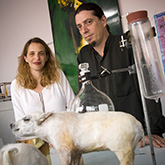Hubris and Hope for Engineering Brains

"Living organisms are nothing more than complex biochemical machines." [1] The above statement, or at least the thought, is something that gets thrown around in biology and especially bioengineering. And it's a very empowering thought: the living thing in front of me is governed by the same physical laws that govern the rest of the universe, including the machines we build. It doesn't have some sort of supernatural vital force flowing through it, just fats and proteins and DNA and small molecules. We can use this. We can fix ourselves when we are sick, we can design new life forms to do our bidding . It's all very exciting. We might even go as far as to engineering a brain. The task would be difficult, but the reward tremendous. Brains are very good at performing difficult computations that top of the line AI is struggling with, and biological neurons tend to use less resources than their artificial cousins. Building a wet, squishy, thinking mac...

